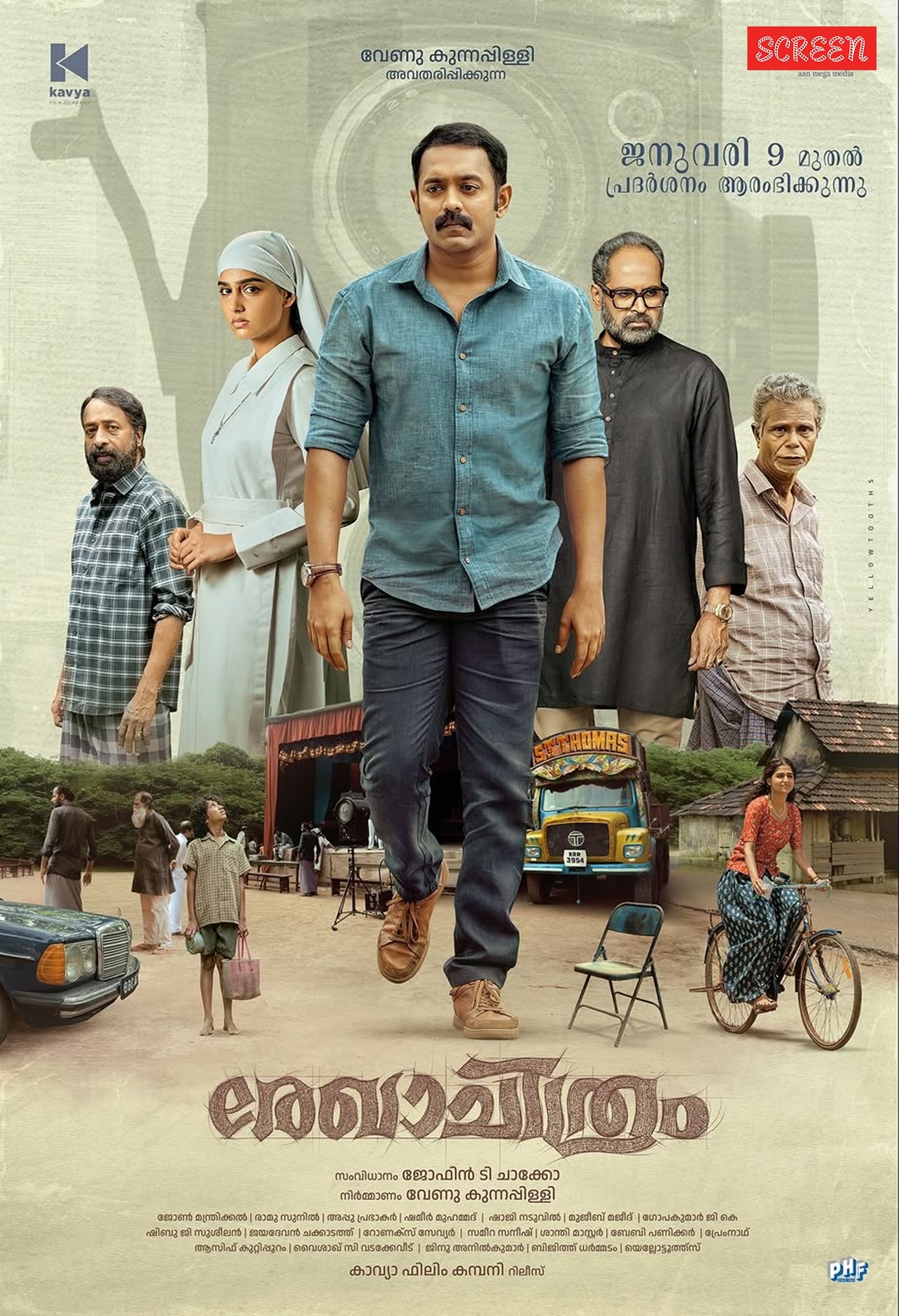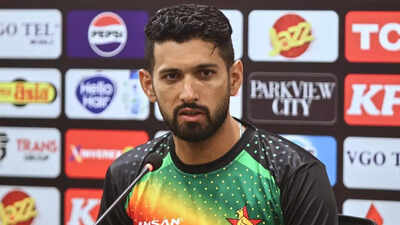Rekhachithram movie review: “Once your face appears in cinema, it becomes a part of history,” a junior artiste supplier (Indrans) tells an 18-year-old woman (Anaswara Rajan) who has just joined him. While this line is impactful and true, what makes it particularly intriguing is that it’s featured in an alternate-history (althist) film, director Jofin T Chacko’s Rekhachithramwherein the makers skillfully drew a parallel timeline, branching off from a specific historical point and letting it run alongside the real one. Interestingly, the movie’s treatment is such that, rather than presenting it as a “what if?” scenario, Rekhachithram evokes the feeling that its core incident could possibly have occurred but remained hidden from the public eye and buried in obscurity for decades.
Though her ambition was to become a renowned heroine, the only reason Anaswara’s character agreed to go with Indrans’ as an extra in Kathodu Kathoram (1985) was because it starred her favourite actor in the lead role: Mammootty. Riding high on dreams, she entered the sets of the Bharathan directorial and, on her very first day, landed an opportunity to stand next to Mammootty in a song that would later become iconic, “Devadoothar Paadi.” Her smartness, confidence and the way she carried herself caught everyone’s attention, including that of Kamal, then an assistant director in Kathodu Kathoram and later a renowned filmmaker.
Cinema Anatomy | Marco: Unni Mukundan’s gorefest is one of the silliest Malayalam films, failing to bury its flaws beneath the bloodshed
However, that day turned out to be the first and the last that any movie personnel saw her ever. She did not return to the set the next day, disrupting the song’s continuity. In fact, no one ever mentioned seeing her again and she vanished without informing anyone. Over time, she was forgotten — until, 39 years later, the Malakkappara police exhumed the skeletal remains of a woman from a nearby forest. During his investigation, CI Vivek Gopinath (Asif Ali) discovers that the timing of the junior artiste’s disappearance coincides with the burial of the body. As the probe progresses, Vivek unearths more pieces of the jigsaw puzzle, though some critical links remain missing; firstly, who was she?
Unlike typical althist films, which reimagine an important, highly influential moment from the past to explore speculative outcomes, Rekhachithram takes an intriguing approach by choosing the production period of a movie, a seemingly less impactful event, as its historical touchpoint and John Manthrickal and Ramu Sunil, who penned the screenplay, handle it well. While this could be seen as playing it safe within the genre, it proves to be a boon for the film, adding a layer of fascination. At the same time, considering the audience’s unfamiliarity with althist as a genre and the risk of viewers mistaking fiction for fact, the writers maintain restraint and push the boundaries only just enough to stay authentic to the movie’s backdrop.
Watch Asif Ali, Anaswara Rajan’s Rekhachithram trailer here:
One of the film’s initial strengths lies in its unconventional protagonist. Vivek is not the archetypal righteous cop; when Rekhachithram begins, he is under suspension for playing online rummy while on duty. After being reinstated, he is posted to Malakkappara, a slow-paced area, as a ‘punishment’. Meanwhile, the discovery of the unidentified skeleton presents an opportunity for Vivek to repair his tarnished reputation, but as the investigation deepens, solving the case becomes a deeply personal mission for him as he is profoundly affected by the fact that the remains of a person, whoever that be, laid buried for decades, waiting for someone to uncover their story and bring it to light.
Unlike his debut directorial The Priest (2021), where he overused horror, Jofin has adopted a more measured approach here. He avoids the pitfalls of excessive suspense or twists, allowing the narrative to unfold naturally, while also ensuring that it ends up being a compelling mystery thriller. The film’s title and its placement itself highlight the amount of thought Jofin put into the project and this has yielded impressive results.
Identity movie review | Tovino Thomas, Trisha’s action thriller is high on style but low on substance
Although John and Ramu weave real-life anecdotes into the script, after reinterpreting them from a fictional perspective — such as writer-actor Jagadish’s account of developing the story for his film Mutharamkunnu PO (1985) and director Kamal’s recollection of briefly considering Anaswara’s character as the heroine for his Mohanlal-starrer Unnikale Oru Kadha Parayam (1987) — the screenwriting duo ensures they don’t go overboard, avoiding anything that could blur the line between fiction and reality. Without resorting to overt “reality checks” on-screen, they maintain a fine balance between fact and fiction. In many ways, Rekhachithram (sketch) is a tribute to the magical allure of cinema, which not only captures stories but also preserves it all as historical records, ensuring that everything and everyone within it becomes an inseparable part of the tapestry.
After months of speculation about the possibility of a de-aged Mammootty appearing in the movie, here you go: Rekhachithram does indeed feature the superstar — but a younger version of him, created using advanced AI technology. While the makers have done a commendable job in capturing his youthful appearance, Jofin and his team, much like their approach to alternate history, use this element too judiciously and incorporate it only when absolutely necessary for the progress of the narrative, ensuring the focus remains on the story rather than overindulging in the “Mammootty factor”, which could have backfired easily. Nonetheless, considering Mammootty has played a fictionalised version of himself in the crime thriller No 20 Madras Mail (1990), it’s not surprising that he agreed to recreate his younger self for an althist film.
 Unlike typical althist films, which reimagine an important, highly influential moment from the past, Rekhachithram takes an intriguing approach by choosing the production period of a movie. (Image: Asif/Facebook)
Unlike typical althist films, which reimagine an important, highly influential moment from the past, Rekhachithram takes an intriguing approach by choosing the production period of a movie. (Image: Asif/Facebook)
Despite many positives, Rekhachithram cannot be considered pitch-perfect, although a bit more work on the writing could have easily ensured that. While John and Ramu manage to keep the audience engaged from the first act, despite the absence of major twists, the film is marred by poor dialogues. While many lines are unimpactful, others are nonsensical and lack organic flow. At the same time, although the film’s minimal use of the Rashomon effect is effective, the script also falls short in terms of character development, which ultimately impacts the overall narrative.
Even as Vivek is introduced as a less-than-righteous cop, he is not given sufficient depth, making his flawed nature feel unnecessary and unexplored. In an attempt to depict Anaswara’s character as highly ambitious, the makers ram too many unnecessary dialogues down her throat, and her overall behaviour too comes across as forced and unconvincing. Although the movie introduces a variety of characters, played by notable actors like Manoj K Jayan, Harisree Ashokan, Siddique and Srikanth Murali, none of them are fully developed and they contribute little to the overall story. In another flaw, midway through, the crime branch takes over the case, removing Vivek from the investigation. However, after this point, the new investigating officers are never seen again, further weakening the script.
Express Exclusive | ‘We can compete with Hollywood,’ says Mohanlal; recalls creating one of the first pan-Indian films
Despite these shortcomings, Asif Ali’s remarkable performance anchors the film, almost masking its obvious flaws. Anaswara Rajan, on the other hand, shines in moments that don’t require dialogue, conveying awe and wonder of her character at being part of the world she dreamed of. However, her performance falls short due to the poor dialogues and the character’s uneven portrayal. In some moments, her portrayal slips into overt cuteness when innocence is called for, which detracts from the overall impact. While Bhama Arun, Megha Thomas and Nishanth Sagar play key roles, none leave a lasting impression due to poor character development, thus underutilising their talents. This issue extends to the senior character actors too. However, Zarin Shihab delivers an excellent performance, despite her limited screen time.
While Mujeeb Majeed’s background score is impressive and complements the film well, the songs feel entirely out of sync with the movie’s tone. On the other hand, Appu Prabhakar’s cinematography stands out, capturing the essence of different time periods with remarkable precision, making the audience feel truly immersed in the world. Shameer Muhammad’s editing and Shaji Naduvil’s production design also deserve praise.
Rekhachithram movie cast: Asif Ali, Anaswara Rajan, Manoj K Jayan, Harisree Ashokan, Siddique, Zarin Shihab
Rekhachithram movie director: Jofin T Chacko
Rekhachithram movie rating: 3 stars
Discover the Benefits of Our Subscription!
Stay informed with access to our award-winning journalism.
Avoid misinformation with trusted, accurate reporting.
Make smarter decisions with insights that matter.
Choose your subscription package







